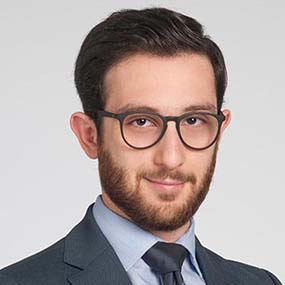Alumni Spotlight: It’s Not Science Fiction—It’s Artificial Intelligence

This certificate graduate is bridging the gap between the technical demands facing the healthcare industry and how higher education can be used to build a better knowledge base for physicians.
Winter 2022
Technology, specifically artificial intelligence (AI), is transforming how humans and machines work together. And in the evolution of global healthcare, the potential for AI is vast. Just like in our everyday lives, AI is increasingly becoming a part of our healthcare eco-system. And indeed, AI is certainly poised to become a transformational force to improve patient outcomes.
Dr. Aiman Altaqi, Healthcare Analytics program graduate, is a board-certified pediatrician and current fellow at Rainbow Babies and the Children’s Hospital of Case Western Reserve University. His interests include global health, healthcare quality, safety, and IT.
He was born and raised in Syria and relocated to the U.S. to pursue his medical training. He completed his pediatric residency at the Cleveland Clinic Children’s Hospital and now provides very specialized pediatric emergency care for critically ill and injured children.
According to Altaqi, “Medicine is advancing daily, and AI is the next big thing that will create the future developments needed for the expansion of pediatric care. Although it will take time, AI will significantly impact clinical medicine, education, quality, safety, and research on a global scale.”
“The online curriculum was all-inclusive and provided me with a considerable number of information-rich articles, videos, and resources to support the lectures.”
— Dr. Aiman Altaqi, Healthcare Analytics Program Graduate
The role continuing education plays to support physicians
Altaqi understands that an additional investment in higher education is needed to supplement his learning so that he can determine how the application of AI will be intertwined into patient care.
Although AI is starting to be implemented in medical administration, supply chain, pharmaceuticals, radiology, and pathology, the real challenge facing physicians is bedside medicine and how patients will accept this as a part of a forward-thinking and emerging medical approach. Even as those barriers do, and will exist, AI has the potential to enhance efficiency, reduce cost, and improve quality and safety for patients.
“In order for me to board the train towards the future of the medical industry, I need to learn the truth from the hype. I need to be better trained to understand the efficacy of AI and how to make its implementation as effective, safe, and ethical as possible.”
Altaqi sought advice from his peers to identify the most meaningful and effective continuing education program to meet his needs and demands. He was searching for a program that would give him a panoramic view of the immense field of health data analytics so that he could choose how to specialize.
“Based on my evaluation of several different health data analytics programs from around the country, I was able to identify the subjects that I wanted to learn. As I was reviewing the curriculum from numerous healthcare analytics programs, I found that UCI had the most comprehensive program and included the critical coursework that I needed to develop and master my skills.”
The upside of a fully online certificate program
Many students might perceive that an online program format may not provide the same learning and networking opportunities as that of a face-to-face program. The fact is that online courses are just as robust and still result in meaningful connections with peers—and based on Altaqi’s experience, he agrees.
“The online curriculum was all-inclusive and provided me with a considerable number of information-rich articles, videos, and resources to support the lectures. As a novice in my field, this teaching approach helped me grasp each concept with relative ease.”
World-class education leads to world-class medical care
Altaqi felt he didn’t have a foundational background in the IT/data analytics field and was concerned about the gap in comparison to his classmates who may have degrees or even work in the field already. However, he found that the curriculum, and the instructors who delivered it, were supportive, responsive, and helped set a common ground to build upon, regardless of each student’s viewpoint and experience.
“This certificate is a critical stepping-stone in my plan to deep dive into health AI and how to apply it into quality and safety in pediatric healthcare. Considering the infancy of AI in healthcare, I may need to take a step back and learn about AI in other industries and delve more into its technicalities.”
Learn more about the Healthcare Analytics Specialized Studies Program.
